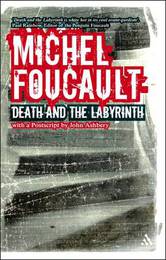
|
Death and the Labyrinth
Paperback / softback
Main Details
| Title |
Death and the Labyrinth
|
| Authors and Contributors |
Edited by James Faubion
|
|
By (author) Michel Foucault
|
|
Translated by Charles Ruas
|
| Physical Properties |
| Format:Paperback / softback | | Pages:240 | | Dimensions(mm): Height 216,Width 138 |
|
| Category/Genre | Literary theory |
|---|
| ISBN/Barcode |
9780826493620
|
| Classifications | Dewey:848.91209 |
|---|
| Audience | | Undergraduate | | Postgraduate, Research & Scholarly | |
|---|
|
Publishing Details |
| Publisher |
Bloomsbury Publishing PLC
|
| Imprint |
Continuum International Publishing Group Ltd.
|
| Publication Date |
30 November 2006 |
| Publication Country |
United Kingdom
|
Description
Death and the Labyrinth is unique, being Foucault's only work on literature. For Foucault this was "by far the book I wrote most easily and with the greatest pleasure". Here, Foucault explores theory, criticism and psychology through the texts of Raymond Roussel, one of the fathers of experimental writing, whose work has been celebrated by the likes of Cocteau, Duchamp, Breton, Robbe Grillet, Gide and Giacometti. This revised edition includes an introduction, chronology and bibliography to Foucault's work by James Faubion, an interview with Foucault, conducted only nine months before his death, and concludes with an essay on Roussel by the poet John Ashbery.
Author Biography
James Faubion is at Rice University, USA. Michel Foucault (1926-1984) was a French philosopher and widely recognised as one of the most original and influential thinkers of the 20th Century. Charles Ruas is the translator of Death and the Labyrinth.
Reviews"One of the important things about the Roussel book, however, is that it shows that approach to literature in full flight. And reading it is a pleasure, but a pleasure that is not unmixed with pain. Foucault's own enjoyment, not only of the texts of Roussel, but of the process of producing his analyses of those texts, is contagious. And if that makes us go back and read some of Roussel's work, then the book has served an important function... given Foucault's own fondness for subjugated knowledges and forgotten histories, we would be well justified in uncovering this secret love of an anguished and obsessive young philosopher." -Timothy O'Leary, Foucault Studies, February 2009 -- Timothy O'Leary
|